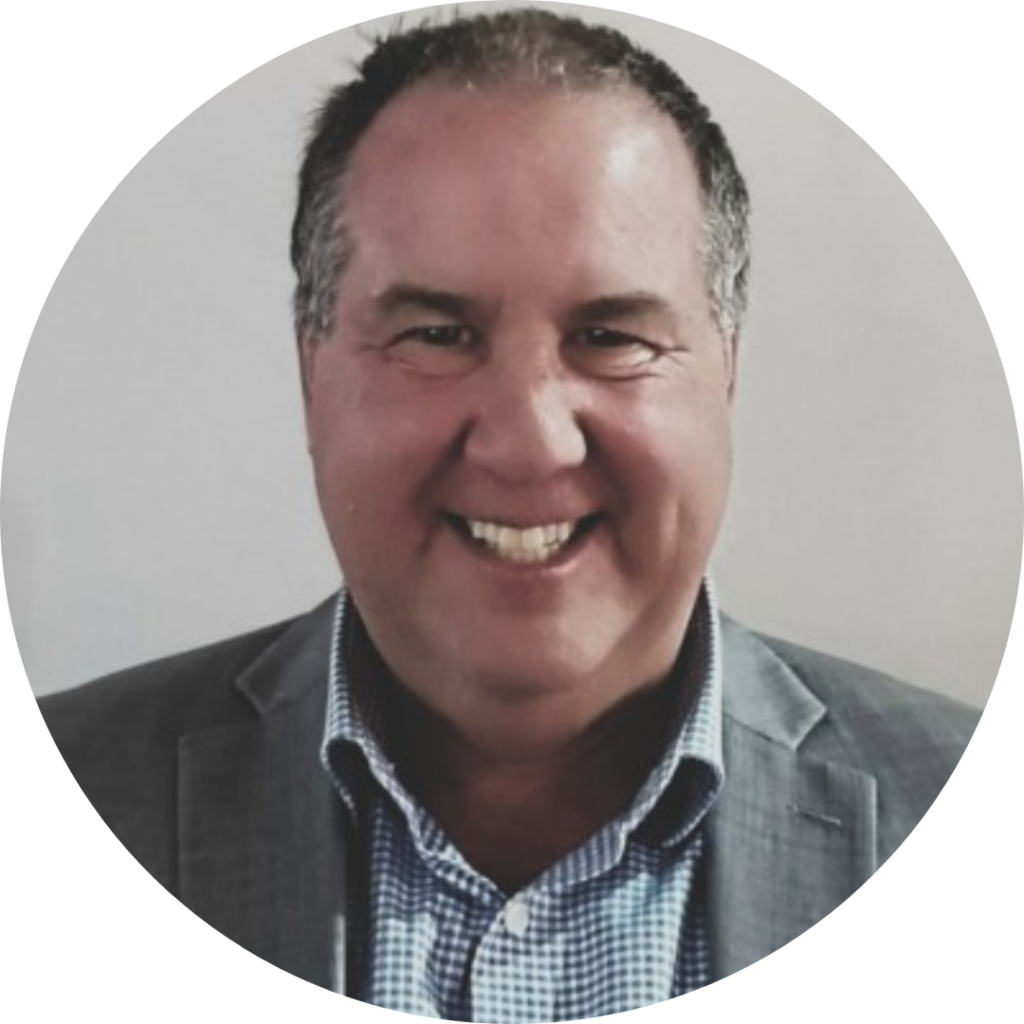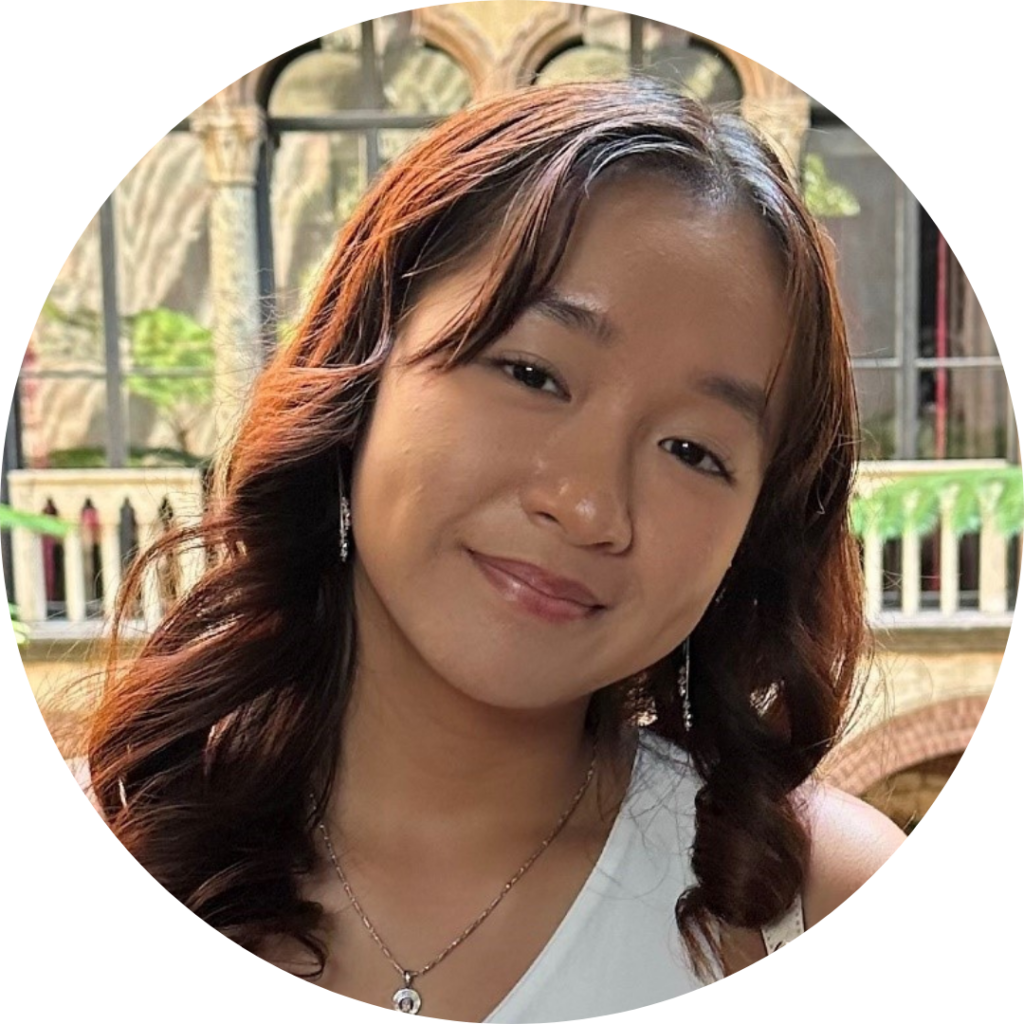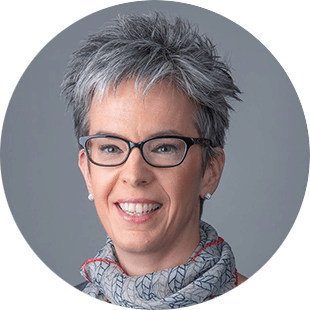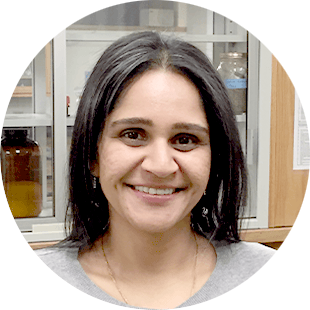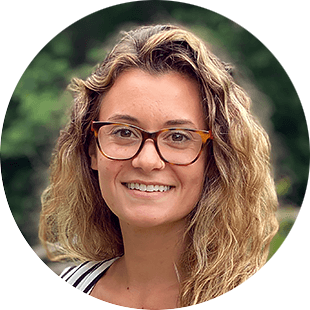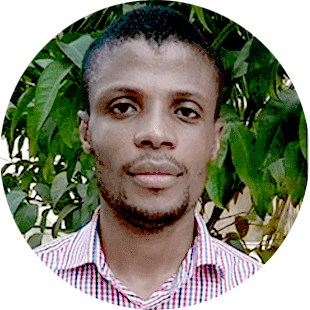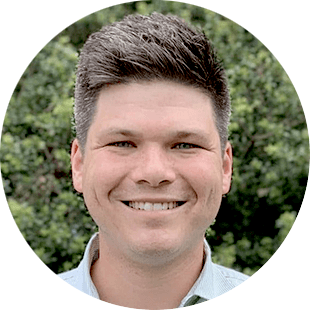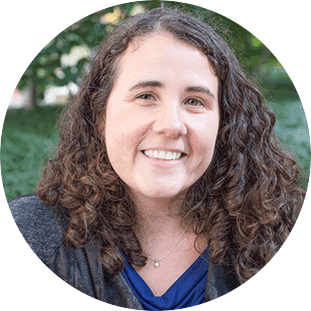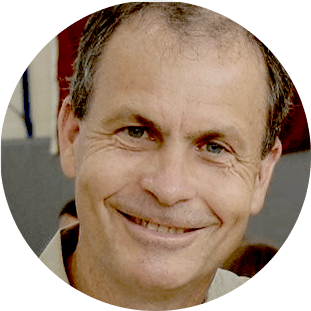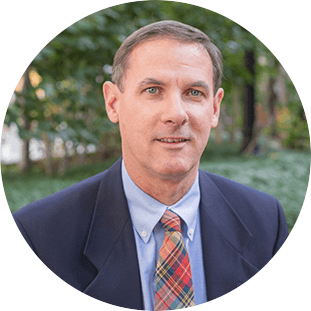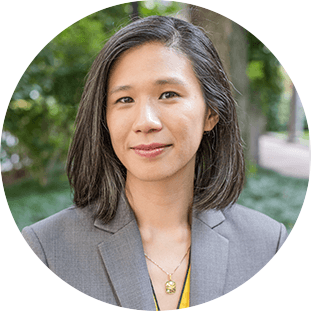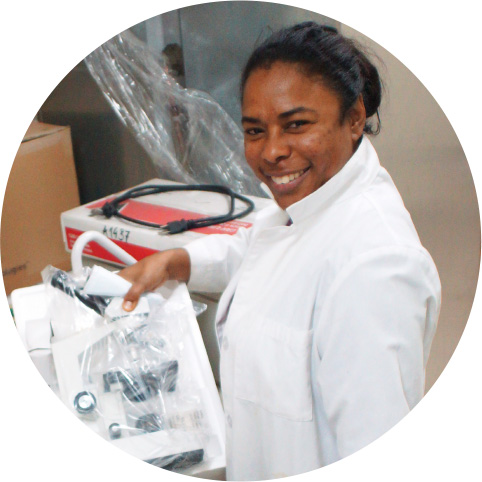
Information for applicants
Through Instrumental Access, Seeding Labs connects universities and research institutes in low- and middle-income countries with high-quality laboratory equipment.
Quick Links
How the program works
Seeding Labs Accepts Equipment Donations
Throughout the year, Seeding Labs solicits donations of surplus laboratory equipment and supplies from our network of 200+ equipment donors. These donors include equipment manufacturers, pharmaceutical companies, and many other types of organizations. Donations are received, inventoried, checked for quality, and stored at our warehouse near Boston, Massachusetts in the United States.
Awardees Choose Their Equipment
After they are accepted to the program, Instrumental Access awardees have an opportunity to “shop” in our available inventory during a specific 3-week period to choose the items that will comprise their shipment. Awardees use our online shopping portal to select enough equipment to fill a small (20-foot) shipping container.
Awardees contribute financially to offset program costs
Awardees pay a fee that helps to offset a portion of the program’s operating costs. We invoice for the service fee at the beginning of the shopping period, with payment due when we have agreed on the contents of the shipment.
We collaborate on shipment logistics
Just before and during the shopping period, we work closely with awardees to ensure that the shipment paperwork is in order and that we’ve provided all the information they need to navigate their country’s customs and import regulations.
Seeding Labs arranges international freight
As soon as we receive the program fee, we pack the items into a container and ship them (at our expense) to the nearest ocean port to in the awardee’s institution.
Awardees use the equipment for teaching and research
Upon arrival at the port, awardees are responsible for clearing the container through customs and arranging for ground transportation from the port to their campus. After that, it’s up to the awardee to use and maintain the equipment.
Benefits of an Instrumental Access award
Equipment and supplies
A typical Instrumental Access shipment consists of 100-150 individual items of equipment, glassware, and consumables that have been selected by our awardees to meet their specific needs for teaching and research.
What’s the value of a typical shipment? It isn’t straightforward to assess for a number of reasons: the contents of every shipment are unique; there’s no gold standard for valuation of used equipment; and prices/availability vary widely depending on where you are in the world.
Using our most conservative valuation method, the average for our shipments over the last few years has been around $100,000 US. We estimate that the cost to purchase the items new in the US would be 3-4 times higher, in the range of $300,000-$400,000.
For more information about our inventory, see below.
Membership in our global network
New awardees join a vibrant and growing global community of awardees and supporters. As of June 2023, this network includes 105 institutions in 39 countries, as well as more than 200 organizations around the world.
Access to additional opportunities and resources
Your relationship with Seeding Labs won’t end with the arrival of a shipment. We partner with external organizations to offer exclusive benefits and opportunities to our awardees on an ongoing basis. In the past, these opportunities have included plasmids, manuscript editing services, and more.
We also do everything in our power to highlight the accomplishments of our awardees, including generating media attention if desired. We have worked with reporters to feature the work of our awardees in international media outlets such as Nature, The Boston Globe, USAID Frontlines, Forbes, and SciDevNet.com.
What is required of awardees?
Program fee
Participation in Instrumental Access is economical, but it is not free. Awardees pay a fee that helps to offset a portion of our procurement, logistics, insurance, transportation, and administrative costs.
Please note that the program fee is technically a service fee; you are not purchasing the equipment from Seeding Labs. The equipment is a donation for education and research purposes, which can be an important distinction if your country offers waivers from customs and import fees for donated goods.
The program fee is adjusted based on the income level of the applicant’s country:
Afghanistan, Algeria, Angola, Bangladesh, Belize, Benin, Bhutan, Bolivia, Burkina Faso, Burundi, Cabo Verde, Cambodia, Cameroon, Central African Republic, Chad, Côte d’Ivoire, Democratic Republic of Congo, Djibouti, Egypt, El Salvador, Eritrea, Eswatini, Ethiopia, Gambia, Ghana, Guinea-Bissau, Haiti, Honduras, India, Indonesia, Kenya, Kiribati, Kyrgyz Republic, Lao PDR, Lesotho, Liberia, Madagascar, Mali, Micronesia, Mongolia, Morocco, Mozambique, Mauritania, Myanmar, Nepal, Nicaragua, Niger, Nigeria, Pakistan, Papua New Guinea, Philippines, Republic of the Congo, Rwanda, Samoa, São Tomé and Principe, Senegal, Sierra Leone, Solomon Islands, Somalia, Sudan, South Sudan, Sri Lanka, Tajikistan, Tanzania, Timor-Leste, Togo, Tunisia, Uganda, Ukraine, Uzbekistan, Vietnam, West Bank and Gaza, Yemen, Zambia, Zimbabwe
Last updated 19 July 2022Albania, American Samoa, Antigua and Barbuda, Argentina, Armenia, Azerbaijan, Belarus, Bosnia and Herzegovina, Botswana, Brazil, Bulgaria, Chile, China, Colombia, Costa Rica, Dominica, Dominican Republic, Ecuador, Equatorial Guinea, Fiji, Gabon, Georgia, Grenada, Guatemala, Guyana, Jamaica, Jordan, Kazakhstan, Kosovo, Lebanon, Libya, Malaysia, Maldives, Marshall Islands, Mauritius, Mexico, Moldova, Montenegro, Namibia, North Macedonia, Panama, Paraguay, Peru, Poland, Romania, Serbia, Seychelles, South Africa, St. Kitts and Nevis, St. Lucia, St. Vincent and the Grenadines, Suriname, Thailand, Tonga, Trinidad and Tobago, Turkey, Turkmenistan, Tuvalu, Uruguay
Last updated 19 July 2022Payment must be made in US dollars via direct wire transfer (preferred) or letter of credit. It is due after equipment selection is complete, so you will know the exact contents of your shipment before you pay.
If you intend to raise funds from external sources, or if there are other unusual circumstances that apply to your situation, please contact us to discuss. However, please note that Seeding Labs does not have additional funds available to further subsidize this cost.
Other monetary costs
In addition to the program fee, awardees should budget for other costs that can arise as a result of participation. These are not costs imposed by Seeding Labs, but they would be your responsibility and should be taken into account when deciding whether this program is right for you. They include:
- Any costs associated with customs clearance in your country. At a minimum, this usually includes hiring a clearing agent. Any costs associated with required inspections will be your responsibility, as will any applicable taxes or duties.
- Local transportation of the container from the port of entry (an ocean port) to your campus.
- Electrical power conversion, as many items in our inventory are configured for the US electrical power grid (120V/60Hz). In most other regions of the world, these items will require voltage transformers, plug adapters, and possibly frequency converters.
- All costs associated with installation, calibration, maintenance, repair, and use of the equipment. Setup costs can be substantial, especially given that you will be receiving 100+ items at the same time.
- Any additional costs associated with selected items that are not included in the donation. We pass on to you whatever donors give to us, but some items in our inventory are donated to us without components that are required to use them such as accessories, rotors, pumps, columns, and software. Information about what is included will be available to you at the time of selection so that you can decide for yourself whether you want to take on these costs.
- All wire fees, banking fees, or other costs associated with payment of the program fee in US dollars.
Time and effort
Participation in Instrumental Access requires a substantial time commitment on the part of both the awarded department and the institution as a whole.
The individual who serves as primary contact can expect to devote several hours per week to coordination during the most active phases of shipment preparation, such as the equipment selection period, and for required communication and reporting to Seeding Labs.
In addition, it is typical for a number of other offices and individuals from the awarded institution to be involved in different aspects of the collaboration, including procurement, finance, legal, public relations, and senior leadership.
Our donation process can require considerable flexibility and patience on the part of everyone involved.
Who is eligible to apply?
- Institution type: Applicants must be one of three types of institutions:
- Colleges, Universities, Polytecnics, or other degree-granting institutions of tertiary education
- University-affiliated research institutes
- Public research institutes that are actively engaged in research training
If you are a college or university, we typically partner with a single academic department, as this is the scale at which the program is designed to meet equipment needs.
However, we will consider working with other sub-units (such as a school or college, two collaborating departments, or a central lab facility) on a case-by-case basis. Please contact us to discuss your situation.
Individuals, lab groups, and research projects are not eligible to apply on their own.
Hospitals, clinics, primary and secondary schools, for-profit companies, and NGOs not of the types listed above are not eligible.
- Geography: Applicant institutions must be located in an eligible country.
Afghanistan, Algeria, Angola, Bangladesh, Belize, Benin, Bhutan, Bolivia, Burkina Faso, Burundi, Cabo Verde, Cambodia, Cameroon, Central African Republic, Chad, Côte d’Ivoire, Democratic Republic of Congo, Djibouti, Egypt, El Salvador, Eritrea, Eswatini, Ethiopia, Gambia, Ghana, Guinea-Bissau, Haiti, Honduras, India, Indonesia, Kenya, Kiribati, Kyrgyz Republic, Lao PDR, Lesotho, Liberia, Madagascar, Mali, Micronesia, Mongolia, Morocco, Mozambique, Mauritania, Myanmar, Nepal, Nicaragua, Niger, Nigeria, Pakistan, Papua New Guinea, Philippines, Republic of the Congo, Rwanda, Samoa, São Tomé and Principe, Senegal, Sierra Leone, Solomon Islands, Somalia, Sudan, South Sudan, Sri Lanka, Tajikistan, Tanzania, Timor-Leste, Togo, Tunisia, Uganda, Ukraine, Uzbekistan, Vietnam, West Bank and Gaza, Yemen, Zambia, Zimbabwe
Last updated 19 July 2022Albania, American Samoa, Antigua and Barbuda, Argentina, Armenia, Azerbaijan, Belarus, Bosnia and Herzegovina, Botswana, Brazil, Bulgaria, Chile, China, Colombia, Costa Rica, Dominica, Dominican Republic, Ecuador, Equatorial Guinea, Fiji, Gabon, Georgia, Grenada, Guatemala, Guyana, Jamaica, Jordan, Kazakhstan, Kosovo, Lebanon, Libya, Malaysia, Maldives, Marshall Islands, Mauritius, Mexico, Moldova, Montenegro, Namibia, North Macedonia, Panama, Paraguay, Peru, Poland, Romania, Serbia, Seychelles, South Africa, St. Kitts and Nevis, St. Lucia, St. Vincent and the Grenadines, Suriname, Thailand, Tonga, Trinidad and Tobago, Turkey, Turkmenistan, Tuvalu, Uruguay
Last updated 19 July 2022- Equipment needs: Applicants should need a broad and diverse set of equipment and supplies in our inventory (for more information, please see About Our Inventory below).In practice, what this means is that we are typically a good fit for departments of biology, chemistry, and applied sciences using these techniques, like biomedicine, agricultural sciences, environmental sciences, and closely related fields of engineering.
We do not have appropriate equipment for departments of physics, computer science, mechanical engineering, electrical engineering, mathematics, business, or the humanities.
If your institution is primarily looking for just one or two very specific items, the program will not be a good fit. We’re looking for awardees who need what we can supply: a 20-foot shipping container full of equipment and supplies. In addition, the more specialized your needs, the less likely it is that we will have on hand exactly what you need when it’s your turn to select. - Ability to meet program requirements: Applicants must be able and willing to meet all program requirements, including ability to pay the program fee. For more on program requirements, see the previous section.If you have any questions about eligibility or would like to discuss your situation in more detail, you are strongly encouraged to contact us.
About our inventory
What types of items can be found in the Seeding Labs inventory?
Our inventory consists of new and gently-used surplus equipment provided by our equipment donors.
About a quarter of our equipment is brand new, usually donated by manufacturers. The rest of the equipment is gently used. All supplies in our inventory are new and in full, unopened cases.
We accept instruments, glassware, and non-perishables that are commonly used in biology and chemistry labs. We focus on biology and chemistry exclusively because the majority of our equipment donors are pharmaceutical and biotech companies, as well as the manufacturers that sell to them.
We do not solicit and rarely or never accept:
- Equipment specialized for field or agricultural research
- Clinical/medical equipment and supplies
- Industrial scale or high-throughput equipment
- Equipment specialized for physics or engineering (except chemical and biological)
- Computers, audiovisual equipment, vehicles, furniture, and office supplies
- Reagents and chemicals
You can review our target list for equipment donors here.
In addition, there are many categories of items that we actively seek but rarely receive—and therefore cannot meet demand from our awardees. An incomplete list of examples includes:
- Autoclaves
- DNA sequencers
- Gas chromatographs
- Ice machines
- Imagers and photodocumentation systems
- Mass spectrometers
- Specialized microscopes
- Real-time PCR machines
- Ultra-low (-140° C) freezers
What will be available when it’s your turn to select?
The truth is that we can’t say exactly. We always have a wide variety of equipment and supplies available, but our inventory constantly changes as new donations come in and other shipments are fulfilled.
What we have on hand today is not what we’ll have next week, let alone next year. For this reason, we can’t provide you with a list of what will be available until it’s your turn to select. In addition, and importantly, we can’t guarantee the availability of any specific item, make, or model.
The experience is more similar to hunting for bargains at a market than placing an order with a manufacturer for the exact item and specification that you need. We provide excellent return on investment, but we’re only a good fit for groups with needs that are broad and flexible enough to take advantage of what we can offer.
What is the condition of the equipment?
Since most of our inventory is gently used, quality control is particularly important. We have multiple processes in place to ensure the quality of equipment in our inventory.
First, we work closely with our donors to ensure quality. We do not accept an item unless the donor can ensure us that it is fully functional at the time of donation. We do not accept items that are partially-functional or in need of repairs.
Second, for items that require specialized reagents, software, or advanced technical support, we check with the manufacturer to verify that the item is not obsolete—meaning that it is still supported by the manufacturer.
We do not usually accept obsolete items, although we do make a handful of exceptions for items that are technically obsolete but still in high demand. For the exceptions, we disclose that the item is obsolete at the time of equipment selection so that awardees can decide for themselves whether an unsupported item will be useful.
Third, we perform functional testing as feasible when the items are received. We have a testing protocol for every category of equipment that we accept.
However, our testing is currently limited to what can be accomplished in a warehouse setting. We do not have access to 240v power lines, water, gas, reagents, samples, standards, software, or skilled technicians.
What this means in practice is that the more complex an item is, the less likely it is that we’ll be able to test it fully. For many of the most sophisticated analytical instruments in our inventory, we have to rely on a visual inspection and the word of our donors that they work.
Our goal is for every item we ship to be fully functional and ready to use, and we’re always looking for ways to improve our quality control processes. However, they aren’t perfect.
It’s normal for there to be issues with a few items from every shipment, and awardees should anticipate this.
Because we are not a manufacturer, we are unable to offer refunds, replacements, or other warranties.
Application and review process
- Submit a written application
Written applications will be reviewed for eligibility, completeness, and fit for the program. We are looking for awardees who can meet all program requirements and are poised to make good use of what we can provide: a container full of laboratory equipment and supplies to be selected from our inventory. - Introductory conversation with Seeding Labs
Following application review, top-scoring applicants will be invited to speak with us via Zoom or Skype about their objectives, existing infrastructure and expertise, and equipment needs. - Accept a program slot
Program slots, or specific time periods for equipment selection and subsequent payment of the program fee, will be offered to qualified candidates as they become available, typically with a 3-6 month time lag (meaning that the selection window would be set to begin 3-6 months from the time of acceptance).
Candidates will have the option to accept an offer or to refuse and wait for another. We will make every effort to find a more suitable slot if the first one is turned down, but we cannot guarantee that one will be available. - Sign letter of agreement
New awardees and Seeding Labs sign a detailed Letter of Agreement that describes the relationship and spells out the roles and responsibilities of both parties in detail. This document must be signed by an official who is authorized to enter into agreements on behalf of the entire institution, typically the Vice Chancellor or equivalent.
